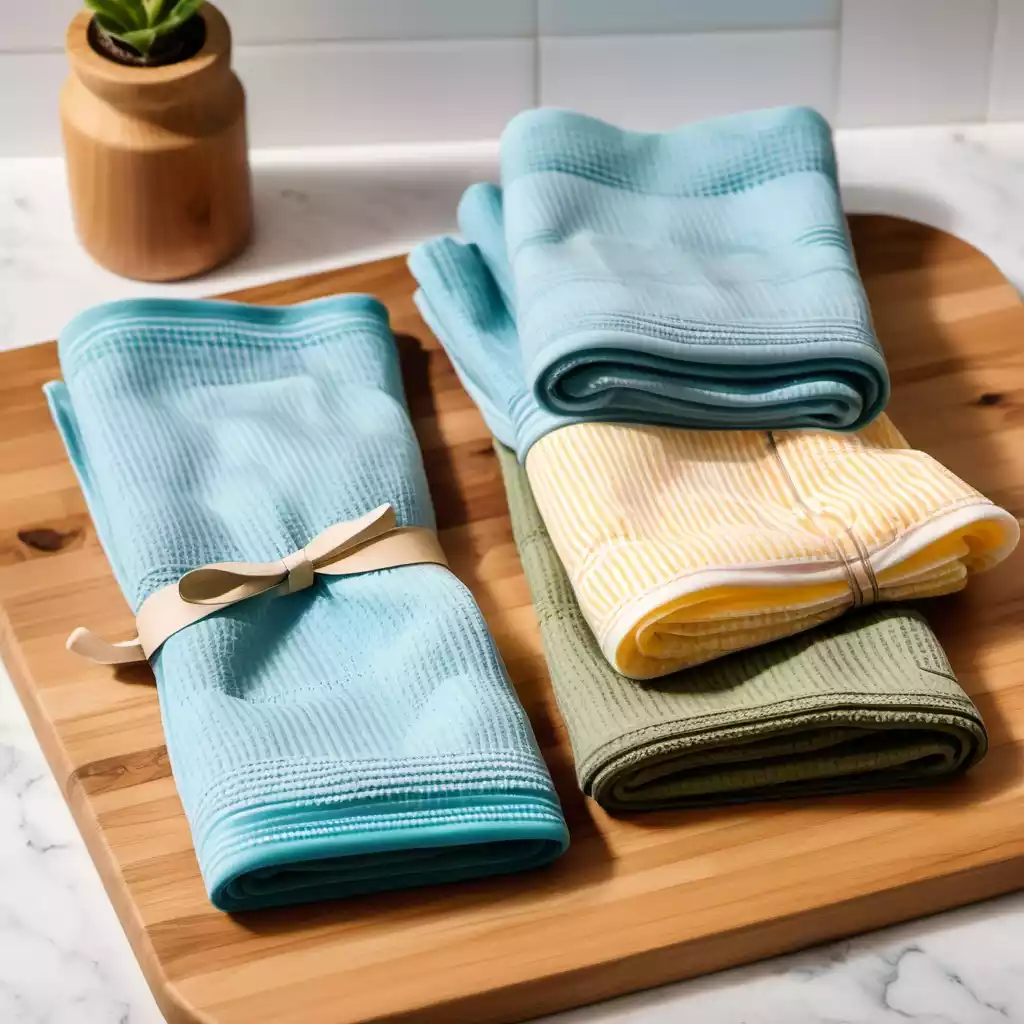
Ever thought about how many paper towels you go through in a week? It might surprise you! Switching to reusable kitchen towels is not only a great way to reduce waste but also an excellent way to save money over time. We all know how convenient paper towel rolls are, but there’s a downside. They’re expensive to keep buying and are harmful to the environment. Reusable towels offer a better alternative, combining sustainability, durability, and cost-effectiveness. Plus, they can handle almost any kitchen task you throw at them!
What Are Reusable Kitchen Towels?
Reusable kitchen towels are exactly what they sound like—towels you can wash and reuse instead of throwing away after one use, like paper towels. They come in various materials, such as cotton, bamboo, and microfiber, and are designed to absorb spills, wipe surfaces, and even dry dishes, all without being tossed in the trash. These towels are more durable than their disposable counterparts and can often last for years with proper care.
The Problem with Paper Towel Rolls
We get it, paper towel rolls are convenient. You spill something, you grab a sheet, and you toss it away. But think about this: the average household can go through several rolls of paper towels per week, and that adds up—not just in cost but in environmental impact. Most paper towels are single-use, and that means more waste ends up in landfills. Over time, constantly buying paper towels becomes a financial burden, not to mention how much paper you’re throwing away.
Benefits of Using Reusable Kitchen Towels
Eco-Friendly Alternative
By switching to reusable kitchen towels, you’re reducing your household waste. Think about all the paper towels you won’t need anymore! Reusable towels are made from sustainable materials and can be washed and reused hundreds of times, making them a greener choice for your home.
Cost-Effective Solution
Imagine not having to buy paper towels every time you go grocery shopping. Sure, you’ll invest a little more upfront for a set of reusable towels, but over time, you’ll save a lot of money. One set of towels can replace countless rolls of paper towels, helping your wallet and the planet.
Durability and Versatility
Unlike paper towels, which are designed for single use, reusable towels are built to last. They can handle heavy spills, tough scrubbing, and multiple washes. Whether you’re wiping down countertops, drying dishes, or even cleaning up after pets, reusable kitchen towels can do it all.
Types of Reusable Kitchen Towels
Cotton Towels
Cotton towels are a classic choice. They’re absorbent, soft, and great for everyday use. Cotton is a natural fiber, so it’s also biodegradable, making it an eco-friendly option.
Bamboo Towels
Bamboo towels are another excellent choice. Bamboo is a fast-growing plant, which makes it a sustainable resource. These towels are not only eco-friendly but also incredibly durable and highly absorbent, making them perfect for tough kitchen messes.
Microfiber Towels
If you want something that absorbs quickly and dries fast, microfiber towels are your best bet. Microfiber is known for its high absorbency, which makes it ideal for wiping up spills and drying dishes. Plus, these towels dry faster than cotton, reducing the chance of bacteria buildup.
Unpaper Towels
Unpaper towels are reusable cloths that mimic the function of traditional paper towel rolls. They’re made from cotton or bamboo and can be used for just about any kitchen task you’d normally use a paper towel for—minus the waste!
How to Choose the Best Reusable Kitchen Towels
Absorbency
Absorbency is key when choosing kitchen towels. You’ll want towels that can handle spills quickly and efficiently. Microfiber and bamboo are known for their superior absorbency, while cotton provides a soft, balanced absorbency for daily use.
Durability
You need towels that are tough and can stand up to repeated washes. Bamboo and cotton towels tend to last longer and resist tearing better than some synthetic materials.
Ease of Cleaning
Top Reusable Kitchen Towels for 2024
Make sure your reusable kitchen towels are easy to clean. Most can be thrown in the washing machine, but avoid using fabric softeners as they can reduce the towel’s absorbency over time.
Best Overall: X-Clean Microfiber Towels
These microfiber towels strike a perfect balance between absorbency and durability, making them a top choice for any kitchen.
Best for Absorbency: Bamboo Kitchen Towels by Green Earth
These bamboo towels soak up even the biggest spills with ease and dry out fast to prevent odor.
Most Eco-Friendly: Cotton Cloths by EcoLife
EcoLife’s cotton towels are not only biodegradable but also sustainably sourced, making them the eco-friendly pick.
Best Budget Option: Unpaper Towels by Home Basics
For those on a budget, these reusable cotton towels get the job done without breaking the bank.
Most Durable: Heavy-Duty Cotton Towels by Kitchen Pro
Built to last through hundreds of washes, these heavy-duty cotton towels are ideal for any kitchen.
How to Transition from Paper Towel Rolls to Reusable Towels
Start Small
You don’t need to give up paper towels cold turkey. Start by incorporating reusable towels for small tasks, like wiping counters or drying dishes, and gradually increase your usage.
Place Towels in Convenient Locations
Make your reusable towels as accessible as possible. Keep them in the kitchen, near the sink, or wherever you typically reach for paper towels.
Create a Cleaning Routine
Develop a routine for washing your towels. Toss them in the laundry once or twice a week, depending on usage, to ensure they stay fresh and clean.
Reusable Towels for Specific Kitchen Tasks
Wiping Counters and Surfaces
Microfiber towels are great for wiping down surfaces because they’re super absorbent and dry fast.
Cleaning Up Spills
For bigger messes, bamboo or cotton towels are your best friend. They soak up liquids quickly and can handle heavy spills.
Drying Dishes and Hands
Cotton towels work well for drying dishes and hands due to their softness and absorbency.
Caring for Your Reusable Kitchen Towels
Proper Washing Techniques
Always wash your reusable towels in warm water with a mild detergent. This helps to keep them clean without wearing down the fibers.
Avoiding Fabric Softeners
Skip the fabric softeners as they can coat the fibers and reduce absorbency. Instead, use vinegar in the rinse cycle to keep towels soft without affecting their functionality.
Drying Tips
Line drying is best for reusable kitchen towels, but if you must use a dryer, stick to a low heat setting to avoid damaging the fabric.
Common Misconceptions About Reusable Kitchen Towels
They Aren’t as Hygienic as Paper Towels
As long as you wash your reusable towels regularly, they’re just as hygienic as paper towels. In fact, they can even be more sanitary if properly cared for.
They’re Too Expensive
While the upfront cost might be higher, you’ll save money in the long run by not constantly buying paper towel rolls.
They’re Hard to Clean
With the right care, reusable towels are easy to clean. Most can go straight into the washing machine, making maintenance a breeze.
Where to Buy High-Quality Reusable Kitchen Towels
You can find reusable kitchen towels at many retailers, but if you’re looking for reliable, eco-friendly options, check out this.
Final Thoughts: Why Reusable Towels are the Future of Kitchen Cleaning Switching to reusable kitchen towels is a small change that can make a big difference. They’re eco-friendly, cost-effective, and highly versatile. By choosing the right reusable towels for your home, you’re not only helping the environment but also saving money and reducing waste
FAQs
Absolutely! They save you money over time and reduce your environmental impact.
A set of 10–12 should be enough for most households, depending on usage.
Cotton and bamboo towels can be composted once they’ve reached the end of their lifespan.
Ideally, wash them after every few uses, or more frequently if they’re being used for heavy cleaning.
It depends on your needs—bamboo for absorbency, cotton for softness, and microfiber for quick drying.



30 Comments